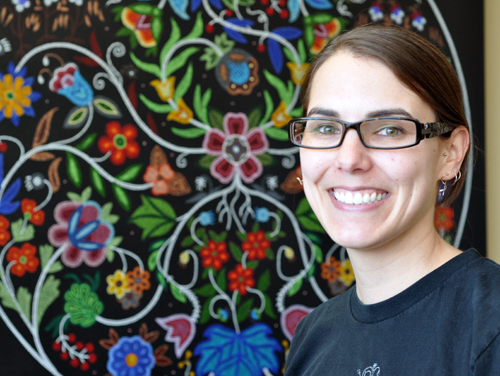
The transition to university can be difficult for anyone, but aboriginal students face unique challenges because they are often the first in their family to attend university and may not know what to expect.
“Aboriginal Peoples are still underrepresented in post-secondary education,” says Cara Wehkamp, manager of the Aboriginal Resource Centre (ARC) at U of G. According to the 2006 census, nine per cent of Ontario’s aboriginal adults between the ages of 25 and 64 had completed a bachelor’s degree, and 36 per cent had graduated from a college or trades program. By comparison, 31 per cent of the non-aboriginal population graduated from university, and 26 per cent completed a college or trades program.
Having three degrees from Guelph under her belt, including a PhD in environmental biology, Wehkamp speaks from personal experience. She grew up in Hanmer, a small town near Sudbury, and is a member of the Antoine First Nation.
“I’ve had very good mentors in my life,” says Wehkamp, whose father is Algonquin and mother is German and Irish. “My parents raised me to be very proud of my First Nations heritage.”
She hopes to instill that same pride in other aboriginal students. More than 300 students, including 11 graduate students, have identified themselves as aboriginal at U of G and its campuses.
“We have aboriginal students in every program, in every year across campus,” says Wehkamp, adding that it’s important for these students to have a space on campus where they can study and socialize with their peers. Located in the Federal Building, the centre is open to people of all backgrounds and has a computer lab, library, kitchen and lounge space. Aboriginal art, selected with the help of curators at the Macdonald Stewart Art Centre, decorates the walls.
ARC was established in 2003 as a unit within Student Life. In 2009, U of G received funding for three years from the Ministry of Training, Colleges and Universities to expand services for aboriginal students. The University received additional funding in 2010 to renovate the centre, promote awareness of aboriginal initiatives, and enhance the sense of community on campus.
Ministry funding also enabled the centre to expand its staff to better address emerging needs. The position of aboriginal liaison and transition co-ordinator was established to raise awareness of post-secondary education opportunities, recruit and guide aboriginal students through the application process and develop programs to ease the transition to university life.
To help first-year students get acquainted with U of G, the centre launched a new program last year called START Aboriginal. Students who participate in the program move into residence a few days early and attend workshops on academic expectations, time management and living with roommates. Family members are also invited to attend.
Another program offered by the centre is called Establishing an Aboriginal Gateway into Learning and Education (EAGLE), which is designed to get students in grades 7 and 8 thinking about attending university. The program gives students a taste of university life by spending three days on campus.
“We’re hoping that some of those younger students will think that university is a place for them,” says Wehkamp. “We’re reaching out very early and starting to build those relationships.” A group of students from the Chippewas of Nawash Unceded First Nation participated last year and will be joined by students from the Six Nations of the Grand River this year.
ARC also works with other campus resources such as Co-op Education and Career Services, Counselling Services, the Learning Commons and the Wellness Centre to ensure that aboriginal students are aware of services available to help them succeed. “We look at the holistic development of the student,” says Wehkamp. “The spiritual, mental, emotional and physical aspects of the student are part of ARC’s mandate.”
Aboriginal elders often participate in cultural events offered by the centre. “We are honoured to have many of our aboriginal community members here to help facilitate our programming throughout the year,” says Wehkamp. “In many aboriginal cultures, elders are our teachers, so it’s important to have them interacting with the University.”
In addition to her role at the centre, Wehkamp is also involved in research to evaluate the protocols for reciprocal exchange between aboriginal and western science knowledge systems with Prof. Steve Crawford, Integrative Biology; Prof. Jeji Varghese, Sociology and Anthropology; and Sandra Auld, director of research ethics. Wehkamp also acts as an advisor on aboriginal issues to the Research Ethics Board. She is one of the founding members of the Aboriginal Student Association, established in 2001.